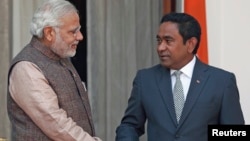The Indian Ocean island country of Maldives has told India it will not allow China to set up military bases on its territory. That is unlikely to calm fears China will consolidate its position in the Indian Ocean.
Maldivian President Abdulla Yameen conveyed the assurance the Maldives will remain a “demilitarized zone” in a letter given to Indian Foreign Minister Sushma Swaraj in New Delhi by the country’s foreign secretary Ali Naseer.
Last week, India’s foreign secretary, Subrahmanyan Jaishankar, visited Maldives to express concerns about a new law that allows foreigners to own land in the country if they invest $ 1 billion and reclaim 70 percent of the land from the sea.
India fears this law will pave the way for China to establish its military presence in the Maldives, a string of 1,200 islands located south of India along major shipping routes in the Indian Ocean.
But the Maldivian government says the law is only meant to attract foreign investors to establish special economic zones in the same way as countries like Dubai. It says this will give the country an economic boost and reduce its reliance on tourism.
Jindal School of International Affairs Dean Sreeram Chaulia said this is unlikely to calm Indian concerns because commercial investments in ports can also be used as strategic assets.
“No matter what the modus operandi, we should look at the final outcome, which is a kind of colonization of the Maldives. They build large commercial interests, which are tied to energy or which are tied to infrastructure projects and modernization.," said Chaulia. "And whenever required, the Chinese do send submarines or they send military aircraft, but not on a permanent basis, but in a fly-in fly-out mode.”
Major investor
China is a major investor in the Maldives, building housing projects, roads and a key bridge. A project to upgrade the Male airport was also handed to a Chinese firm last year after Maldives canceled a deal with an Indian company. Chinese top the number of tourists visiting the picturesque islands.
Experts say the new Maldivian law will make it harder for New Delhi to fend off growing Chinese influence in Indian Ocean countries.
Analyst Darshana Baruah at the Observer Research Foundation in New Delhi said India will have to contend with the Chinese presence in the Indian Ocean, which India considers its strategic backyard.
“We already have tensions along our land border with China in north and opening up possibility for China to have a permanent position within our maritime border is making India nervous," said Baruah. "Tomorrow, if China has so much of economic interest and investments in the Indian Ocean, they will have all rights to protect their economic interest.”
Indian Prime Minister Narendra Modi is expected to visit Maldives soon in a bid to revive India’s strategic clout in the country.




